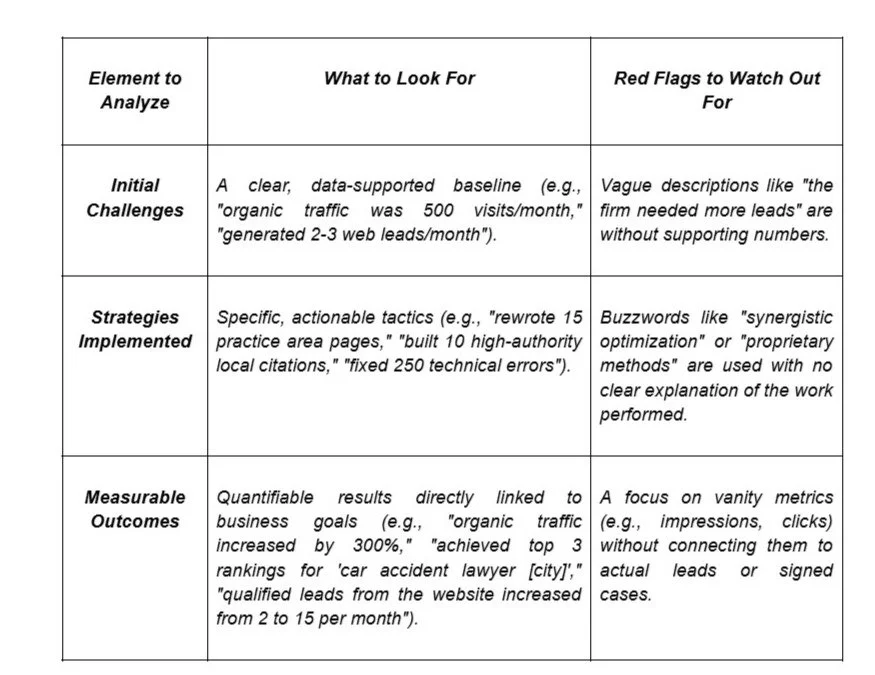Law Firms Should Stop Outsourcing SEO Without Asking These Questions
In the hyper-competitive legal landscape, a firm’s online presence is no longer a vanity project; it is the modern-day front door. Potential clients, whether seeking counsel for a personal crisis or a complex business transaction, begin their search online. This reality has driven many firms to outsource their search engine optimization, hoping to capture a steady stream of new cases. Yet, this delegation of digital trust is often done with a perilous lack of scrutiny. Handing over the keys to your firm's online reputation without a rigorous vetting process is a significant gamble. The objective is not merely to hire a vendor, but to find a strategic partner. This requires moving beyond sales pitches and asking pointed, incisive questions that reveal an agency's true capability and suitability.
Key questions to consider include:
Can you provide case studies or references from law firms in a similar practice area?
How will you measure and report on key performance indicators (KPIs) that matter to us, such as qualified leads and signed cases, not just traffic and rankings?
What is your strategy for building domain authority and acquiring backlinks, and what tactics do you strictly avoid?
What is your policy on asset ownership—who retains control of the website, content, and analytics data if we end our engagement?
The right questions can mean the difference between a surge in qualified leads and a costly, reputation-damaging mistake that takes months, or even years, to correct.
What is your specific experience with marketing for law firms?
An SEO agency that boasts success with e-commerce sites or local restaurants operates in a different universe from the legal sector. The strategies must be fundamentally different, as the rules of engagement are far more stringent. An agency's deep experience in Marketing for law firms is non-negotiable because it signifies an understanding of the ethical guardrails and professional standards that govern attorney advertising.
A generalist marketer might be tempted to use language that promises outcomes or creates unwarranted expectations, inadvertently crossing lines established by state bar associations. They must comprehend the nuances between practice areas—the emotional triggers of a family law client are distinct from the analytical needs of a corporate client. This specialized knowledge prevents costly missteps and ensures that the SEO strategy not only attracts traffic but also builds the firm’s authority and credibility in a manner that is both effective and ethically sound. Without this specific background, an agency is a liability, not an asset.
When it comes to marketing for law firm growth, it’s essential to partner with services that understand both lead generation and legal industry compliance.
How will you tailor your SEO strategy to my specific practice area, for example, if I needed SEO for immigration lawyers?
A generic approach to legal SEO is a clear red flag. If an agency presents a standardized package without first seeking to understand the intricacies of your practice, they are planning to fail on your dime. The path to securing a client seeking a personal injury attorney is vastly different from that of a corporation needing patent litigation counsel. This is why a bespoke strategy is critical.
For instance, effective seo for immigration lawyers requires an exceptionally granular approach. It involves targeting individuals searching for specific visa types like H-1B or EB-5, navigating complex USCIS form numbers, and staying current with rapidly changing immigration policies that directly affect search queries. The agency must demonstrate how it would research these niche terms and the specific questions this clientele asks. They should be able to articulate a plan for creating content that addresses the unique pain points and legal hurdles of your specific clients, proving they can move beyond broad keywords to capture high-intent, case-generating search traffic.
Can you provide case studies and references from other law firms you've worked with?
An agency’s promises are speculative; their past performance is concrete. Any reputable SEO provider specializing in the legal field should be eager to share evidence of their successes. Request detailed case studies from law firms similar to yours in size and practice area. A compelling case study is more than just a glossy testimonial; it is a narrative backed by data. It should articulate the firm's initial challenges, outline the specific strategies implemented, and, most importantly, present measurable outcomes.
Use the following framework to analyze the case studies they provide:
A case study that details these components demonstrates an agency's transparency and focus on results. Furthermore, ask for a list of current or past law firm clients you can contact directly. Speaking with a fellow attorney or firm marketing director provides an unvarnished perspective on the agency’s communication, responsiveness, and ability to deliver on their commitments. This step separates confident experts from those with little to show.
What is your approach to link building and content creation for a law firm's digital marketing campaign?
Content and authority are the twin pillars of a successful legal SEO strategy. Your firm’s website must be a source of valuable information, and it must be recognized as such by other authoritative entities online. Therefore, you must scrutinize an agency’s approach to building this authority. Ask specifically about their link-building philosophy. An ethical agency will talk about earning high-quality backlinks from legal associations, reputable news outlets, and academic institutions, not about buying links or using spammy directories that can damage your reputation.
This is a core component of any effective law firm digital marketing campaign. Inquire about their content creation process. The agency should demonstrate a plan to develop substantive articles, in-depth practice area pages, and helpful resources that address potential clients' most pressing questions. The content must be factually accurate, well-written, and, above all, compliant with the strict advertising rules governing the legal profession, establishing expertise without making improper guarantees.
How do you measure success, and what will reporting look like?
If you can’t measure it, you can’t manage it. A partnership with an SEO agency must be grounded in a shared understanding of what success looks like and how it will be tracked. Vague answers or a focus on "vanity metrics" like total website traffic are cause for concern. Success for a law firm isn't just about getting more clicks; it's about getting the right clicks that convert into clients.
Your discussion should center on KPIs that directly impact your firm's bottom line, such as:
An increase in qualified leads from website contact forms.
A measurable rise in inbound phone calls originating from organic search.
Improved search engine rankings for high-intent keywords (e.g., "personal injury attorney Houston" vs. "what is a tort").
A growth in the number of new clients who cite the website as their point of origin.
The agency must provide regular, transparent reports that are easy to understand. These reports should go beyond raw data to offer analysis and insight into what is working and where adjustments are needed. Insist on a clear reporting schedule and a dedicated point of contact who can walk you through the results and answer your questions, ensuring accountability and a clear view of your return on investment.
Conclusion
Outsourcing your firm's SEO is a significant strategic decision, not merely an administrative one. The growth potential is immense, but the risk of selecting the wrong partner can lead to wasted budgets, reputational harm, and months of stagnation. By stepping into the selection process as an informed and inquisitive participant rather than a passive buyer, you fundamentally shift the dynamic. Asking these direct, challenging questions forces an agency to move beyond its sales pitch and demonstrate its true expertise, ethical standards, and strategic thinking.
This diligence protects your investment and lays the groundwork for a transparent and accountable relationship. Ultimately, the goal is to find a partner who understands the unique contours of the legal profession and is committed to building your firm’s digital legacy. A well-vetted SEO partner becomes an extension of your team, a vital asset in securing your firm's long-term prosperity and prominence in an increasingly digital world.





